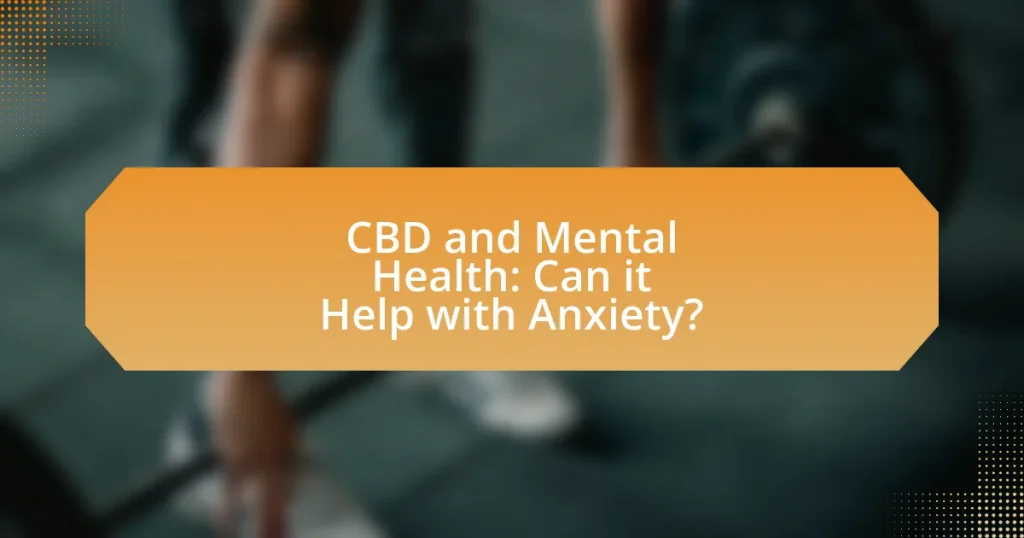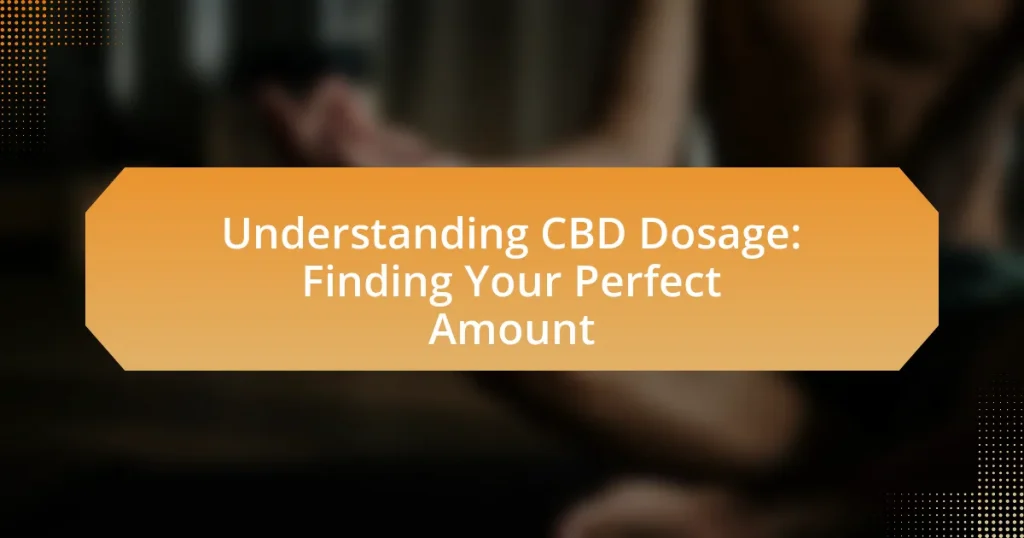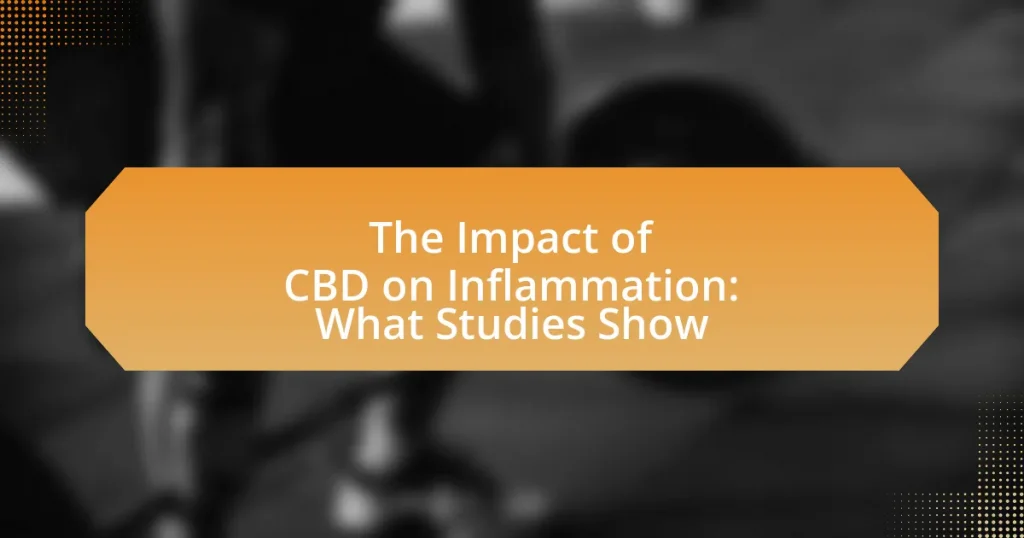CBD, or cannabidiol, is a compound derived from the cannabis plant that interacts with the endocannabinoid system, influencing mood and stress responses. Research indicates that CBD may have anxiolytic effects, potentially alleviating symptoms of anxiety disorders such as generalized anxiety disorder and social anxiety disorder. The article explores how CBD interacts with the brain, its key components affecting mental health, current research on its efficacy for anxiety, and comparisons with traditional anxiety treatments. Additionally, it addresses the potential benefits, risks, legal considerations, and best practices for incorporating CBD into anxiety management plans.
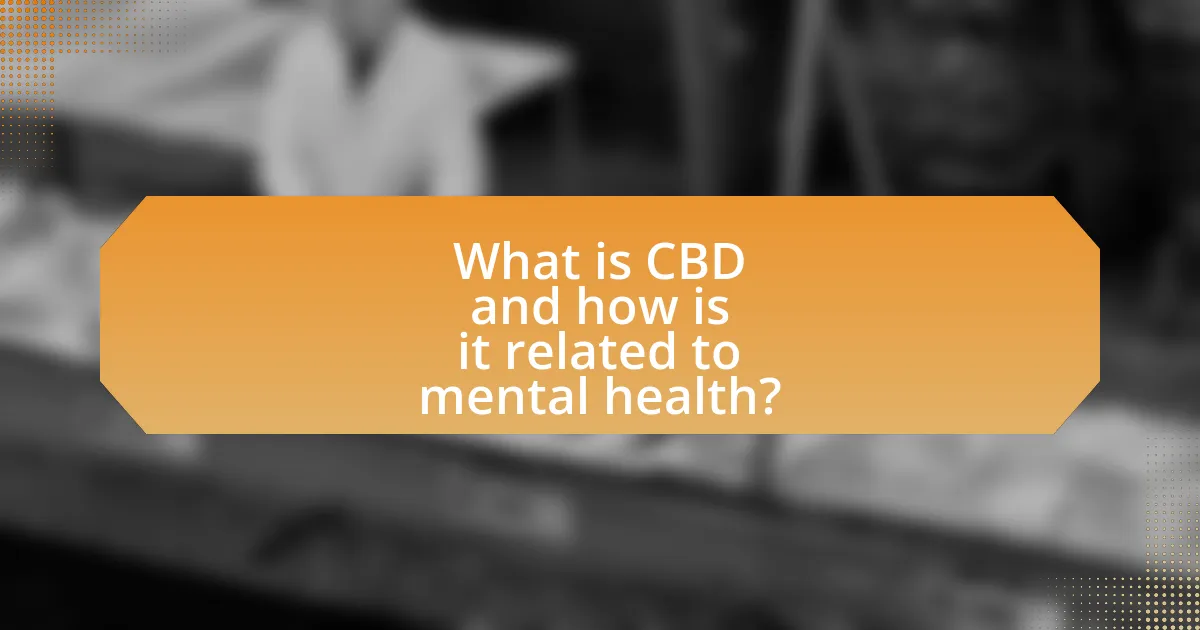
What is CBD and how is it related to mental health?
CBD, or cannabidiol, is a compound derived from the cannabis plant that interacts with the body’s endocannabinoid system, which plays a role in regulating various physiological processes, including mood and stress response. Research indicates that CBD may have anxiolytic (anxiety-reducing) effects, as evidenced by a study published in the Journal of Psychopharmacology, where participants reported reduced anxiety levels after taking CBD before public speaking. Additionally, a review in the journal Neurotherapeutics highlighted that CBD has potential therapeutic benefits for anxiety disorders, suggesting it may help alleviate symptoms associated with conditions such as generalized anxiety disorder and social anxiety disorder.
How does CBD interact with the brain?
CBD interacts with the brain primarily by influencing the endocannabinoid system, which plays a crucial role in regulating various physiological processes, including mood and anxiety. Research indicates that CBD binds to cannabinoid receptors, particularly CB1 and CB2 receptors, which are found throughout the brain and body. This interaction can lead to alterations in neurotransmitter release, promoting a sense of calm and reducing anxiety symptoms. A study published in the Journal of Psychopharmacology by Blessing et al. (2015) found that CBD has anxiolytic effects, suggesting its potential as a treatment for anxiety disorders.
What are the key components of CBD that affect mental health?
The key components of CBD that affect mental health include cannabidiol (CBD) itself, terpenes, and flavonoids. Cannabidiol interacts with the endocannabinoid system, which plays a crucial role in regulating mood and anxiety. Research indicates that CBD may reduce anxiety by influencing serotonin receptors in the brain, as shown in a study published in the Journal of Psychopharmacology, where participants reported lower anxiety levels after CBD administration. Terpenes, such as myrcene and limonene, also contribute to the calming effects of CBD, enhancing its potential benefits for mental health. Flavonoids, which possess anti-inflammatory properties, may further support mental well-being by reducing stress-related inflammation.
How does CBD influence neurotransmitter activity?
CBD influences neurotransmitter activity primarily by interacting with the endocannabinoid system, which plays a crucial role in regulating various physiological processes, including mood and anxiety. Specifically, CBD has been shown to enhance the signaling of serotonin receptors, particularly the 5-HT1A receptor, which is associated with anxiety reduction. Research indicates that CBD can increase serotonin levels in the brain, thereby potentially alleviating symptoms of anxiety disorders. A study published in the Journal of Psychopharmacology by Crippa et al. (2011) demonstrated that CBD administration led to significant reductions in anxiety in participants during a public speaking task, highlighting its impact on neurotransmitter activity related to anxiety management.
What is the current research on CBD and anxiety?
Current research indicates that CBD may reduce anxiety symptoms. A systematic review published in 2020 in the journal “Neurotherapeutics” analyzed multiple studies and found that CBD has anxiolytic effects, particularly in social anxiety disorder and generalized anxiety disorder. Additionally, a 2021 study in “Frontiers in Psychology” demonstrated that CBD significantly decreased anxiety levels in participants during a public speaking task. These findings suggest that CBD could be a promising therapeutic option for managing anxiety disorders.
What studies have been conducted on CBD’s effects on anxiety disorders?
Several studies have investigated CBD’s effects on anxiety disorders, demonstrating its potential therapeutic benefits. For instance, a 2019 study published in “The Permanente Journal” by Shannon et al. found that CBD significantly reduced anxiety scores in a group of 72 adults with anxiety and sleep issues. Another notable study, published in “Neurotherapeutics” in 2015 by Blessing et al., reviewed multiple preclinical and clinical studies, concluding that CBD has anxiolytic effects, particularly in social anxiety disorder. Additionally, a 2020 study in “Frontiers in Psychology” by Bergamaschi et al. indicated that CBD could reduce anxiety in individuals with social anxiety during public speaking tasks. These studies collectively support the notion that CBD may be an effective treatment option for anxiety disorders.
How do the results of these studies compare to traditional anxiety treatments?
The results of studies on CBD for anxiety show that it may be as effective as traditional anxiety treatments, such as selective serotonin reuptake inhibitors (SSRIs). Research indicates that CBD can reduce anxiety symptoms in various contexts, including social anxiety and generalized anxiety disorder, with some studies reporting significant reductions in anxiety levels comparable to those achieved with SSRIs. For instance, a study published in the Journal of Psychopharmacology found that CBD significantly reduced anxiety during public speaking tasks, similar to the effects of traditional medications. This suggests that CBD could serve as a viable alternative or complement to conventional anxiety treatments.
What are the potential benefits of using CBD for anxiety?
CBD may help reduce anxiety by interacting with the body’s endocannabinoid system, which plays a role in regulating mood and stress responses. Research indicates that CBD can lower anxiety levels in individuals with social anxiety disorder, as demonstrated in a study published in the Journal of Psychopharmacology, where participants reported decreased anxiety and improved cognitive function after taking CBD. Additionally, a review in the journal Neurotherapeutics highlighted that CBD has anxiolytic effects, suggesting its potential as a therapeutic option for anxiety disorders.
How might CBD help reduce symptoms of anxiety?
CBD may help reduce symptoms of anxiety by interacting with the body’s endocannabinoid system, which plays a role in regulating mood and stress responses. Research indicates that CBD can influence serotonin receptors in the brain, potentially leading to an anxiolytic effect. A study published in the Journal of Psychopharmacology found that CBD significantly reduced anxiety in participants during public speaking tasks, demonstrating its potential effectiveness in real-world anxiety-inducing situations. Additionally, a review in the journal Neurotherapeutics highlighted that CBD may decrease anxiety-related behaviors in animal models, further supporting its role in anxiety management.
What are the advantages of using CBD over conventional medications?
CBD offers several advantages over conventional medications, particularly in the context of treating anxiety. One significant benefit is its lower risk of side effects; studies indicate that CBD is generally well-tolerated, with fewer adverse effects compared to traditional anxiolytics, which can cause drowsiness, dependency, and withdrawal symptoms. Additionally, CBD does not produce the psychoactive effects associated with THC, making it a safer option for individuals seeking relief without impairment. Research published in the Journal of Psychopharmacology found that CBD can reduce anxiety in both animal and human studies, suggesting its efficacy as a therapeutic agent. Furthermore, CBD has anti-inflammatory properties that may contribute to overall mental well-being, enhancing its appeal as a holistic treatment option.
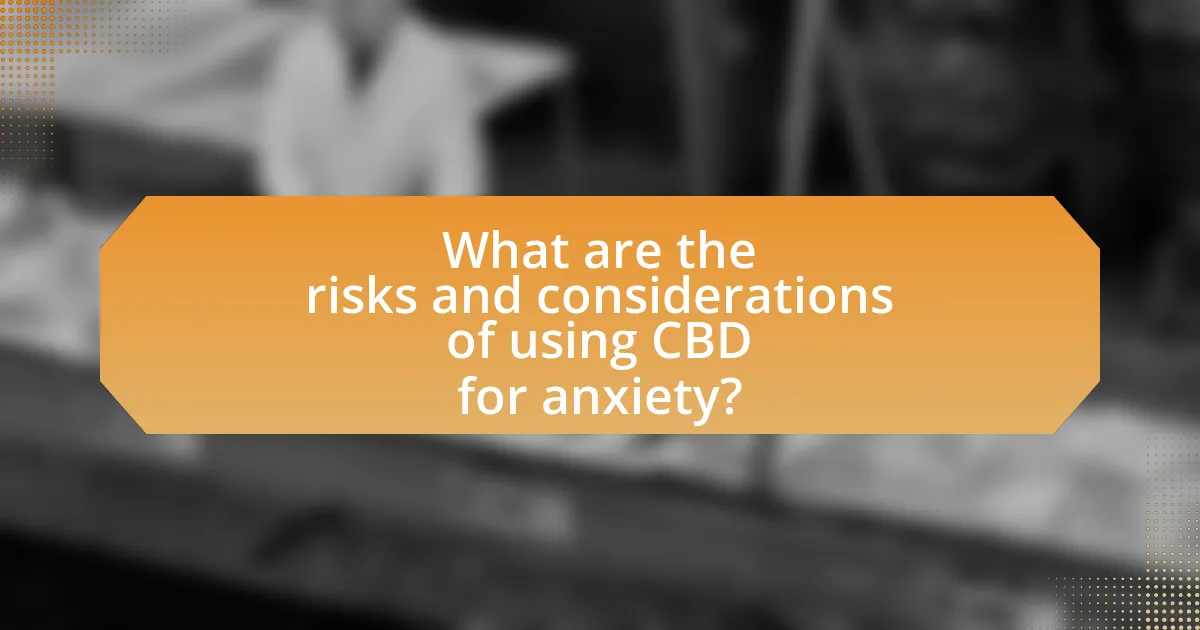
What are the risks and considerations of using CBD for anxiety?
Using CBD for anxiety carries several risks and considerations, including potential side effects, drug interactions, and the lack of regulatory oversight. Side effects may include fatigue, changes in appetite, and diarrhea, as noted in a review published in the journal Cannabis and Cannabinoid Research. Additionally, CBD can interact with other medications, particularly those metabolized by the liver, which may lead to increased side effects or reduced efficacy of those medications. Furthermore, the quality and concentration of CBD products can vary significantly due to insufficient regulation, leading to inconsistencies in dosing and effectiveness. Therefore, individuals considering CBD for anxiety should consult healthcare professionals to evaluate these risks and ensure safe usage.
What side effects are associated with CBD use?
CBD use is associated with several side effects, including fatigue, diarrhea, changes in appetite, and weight fluctuations. Research indicates that these side effects occur in a minority of users, with a study published in the journal “Cannabis and Cannabinoid Research” noting that adverse effects were reported in approximately 10% of participants. Additionally, CBD can interact with certain medications, potentially leading to increased side effects or reduced efficacy of those medications.
How do these side effects compare to those of traditional anxiety medications?
The side effects of CBD for anxiety are generally milder compared to those of traditional anxiety medications, such as benzodiazepines and SSRIs. Traditional medications often lead to side effects like sedation, dependency, weight gain, and sexual dysfunction, which can significantly impact quality of life. In contrast, CBD is associated with fewer and less severe side effects, including fatigue, diarrhea, and changes in appetite, as reported in studies like the one published in the Journal of Psychopharmacology, which found that CBD was well-tolerated in participants with anxiety disorders. This evidence suggests that while both treatment options can have side effects, CBD may present a safer alternative for managing anxiety symptoms.
What should users be aware of regarding dosage and purity of CBD products?
Users should be aware that the dosage and purity of CBD products can significantly impact their effectiveness and safety. Accurate dosing is crucial, as individual responses to CBD can vary widely; studies suggest starting with a low dose and gradually increasing it until the desired effects are achieved. Regarding purity, users should ensure that products are third-party tested for contaminants and accurately labeled for cannabinoid content, as a 2020 study published in the Journal of the American Medical Association found that nearly 70% of CBD products were mislabeled in terms of potency. This emphasizes the importance of purchasing from reputable sources to ensure both the correct dosage and purity of CBD products.
Are there legal considerations when using CBD for anxiety?
Yes, there are legal considerations when using CBD for anxiety. The legality of CBD varies by country and, in the United States, by state. In the U.S., CBD derived from hemp with less than 0.3% THC is federally legal under the 2018 Farm Bill, but some states have their own regulations that may restrict its use. Additionally, the FDA has not approved CBD for treating anxiety, which means that products may not be regulated for safety or efficacy. Therefore, consumers should verify local laws and consult healthcare professionals before using CBD for anxiety.
What is the legal status of CBD in different regions?
The legal status of CBD varies significantly across different regions. In the United States, CBD derived from hemp with less than 0.3% THC is federally legal, but individual states may impose their own regulations. In Canada, CBD is legal and regulated under the Cannabis Act, allowing for both medical and recreational use. In the European Union, CBD is legal if it contains less than 0.2% THC, but regulations can differ by country. In Australia, CBD is available by prescription only, while in countries like the United Kingdom, it is legal as long as it meets specific criteria. These variations highlight the complex legal landscape surrounding CBD globally.
How do regulations affect the availability of CBD products?
Regulations significantly impact the availability of CBD products by determining the legal framework for their production, distribution, and sale. In the United States, for example, the 2018 Farm Bill legalized hemp-derived CBD containing less than 0.3% THC, which expanded market access. However, state-specific regulations can vary widely, with some states imposing stricter controls or outright bans on CBD products, thereby limiting consumer access. Additionally, the FDA has yet to establish comprehensive regulations for CBD in food and dietary supplements, creating uncertainty that can hinder market growth. This regulatory landscape directly influences how readily consumers can obtain CBD products, affecting both availability and pricing.
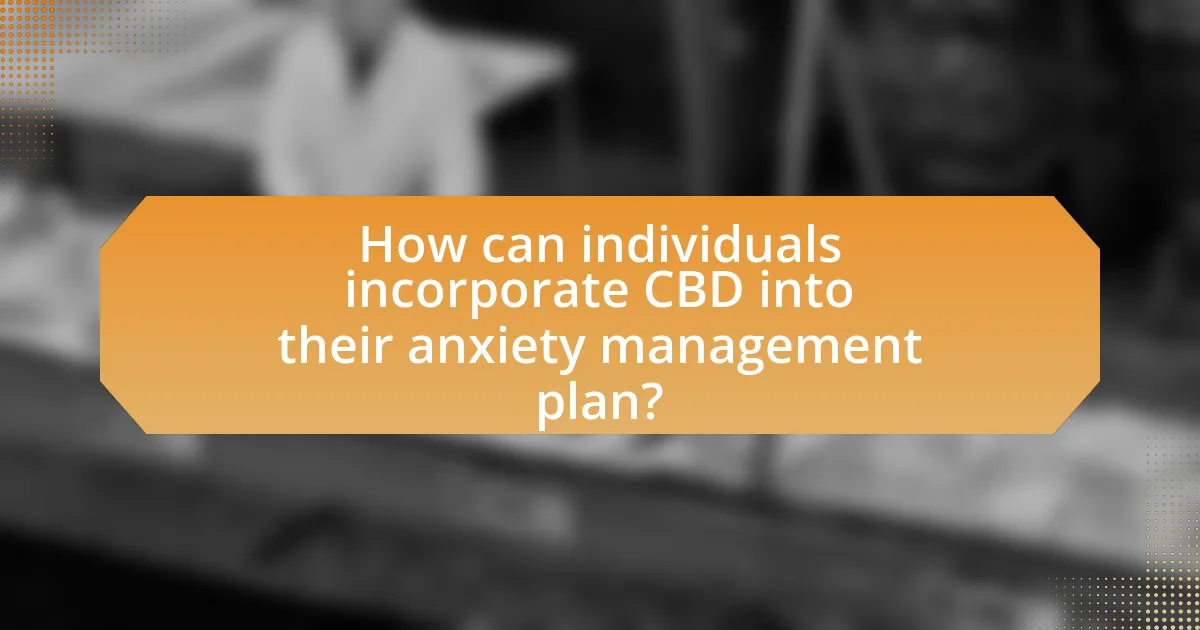
How can individuals incorporate CBD into their anxiety management plan?
Individuals can incorporate CBD into their anxiety management plan by starting with a low dose and gradually increasing it based on their response. Research indicates that CBD may help reduce anxiety symptoms, as evidenced by a study published in the Journal of Psychopharmacology, which found that CBD significantly decreased anxiety in participants during public speaking tasks. It is advisable for individuals to consult with a healthcare professional to determine the appropriate dosage and form of CBD, such as oils, capsules, or edibles, to ensure safe and effective use in their anxiety management strategy.
What are the best practices for using CBD for anxiety relief?
The best practices for using CBD for anxiety relief include starting with a low dose, gradually increasing it, and choosing high-quality products. Research indicates that a low dose can effectively reduce anxiety symptoms without causing adverse effects, as seen in a study published in the Journal of Psychopharmacology, which found that CBD significantly reduced anxiety in participants. Additionally, selecting products that are third-party tested ensures purity and potency, which is crucial for achieving desired effects. Regular use, rather than sporadic consumption, may also enhance the benefits of CBD for anxiety management.
How should one determine the right dosage of CBD for anxiety?
To determine the right dosage of CBD for anxiety, individuals should start with a low dose and gradually increase it while monitoring their response. Research indicates that a common starting dosage is between 5 to 10 mg of CBD per day, with adjustments made based on individual tolerance and effectiveness. A study published in the Journal of Psychopharmacology found that doses ranging from 300 to 600 mg of CBD significantly reduced anxiety in participants, suggesting that higher doses may be effective for some individuals. It is essential to consult with a healthcare professional to tailor the dosage to personal needs and to ensure safety, especially if other medications are being taken.
What forms of CBD are most effective for anxiety management?
The most effective forms of CBD for anxiety management are CBD oil, capsules, and edibles. CBD oil is often preferred due to its fast absorption and ability to provide quick relief, as it can be taken sublingually, allowing it to enter the bloodstream rapidly. Capsules offer a convenient and precise dosage, while edibles provide a longer-lasting effect, although they may take longer to kick in. Research published in the Journal of Psychopharmacology indicates that CBD can significantly reduce anxiety in individuals with social anxiety disorder, supporting the efficacy of these forms in managing anxiety symptoms.
What tips can help maximize the benefits of CBD for anxiety?
To maximize the benefits of CBD for anxiety, individuals should start with a low dosage and gradually increase it until they find the optimal amount that alleviates their symptoms. Research indicates that a dosage range of 10-50 mg of CBD per day can be effective for anxiety relief, as noted in a study published in the Journal of Psychopharmacology, which found that CBD significantly reduced anxiety in participants. Additionally, using full-spectrum CBD products may enhance the effects due to the entourage effect, where various cannabinoids work synergistically. Regular use, consistency in dosage, and combining CBD with other anxiety management techniques, such as mindfulness or therapy, can further enhance its effectiveness.
How can lifestyle changes complement CBD use for anxiety relief?
Lifestyle changes can enhance the effectiveness of CBD for anxiety relief by promoting overall mental well-being and reducing stressors. For instance, regular physical activity has been shown to decrease anxiety levels and improve mood, which can synergistically work with CBD’s anxiolytic properties. Additionally, adopting a balanced diet rich in omega-3 fatty acids and antioxidants can support brain health, further aiding in anxiety management. Research indicates that mindfulness practices, such as meditation and yoga, can lower anxiety symptoms and may complement the calming effects of CBD. A study published in the Journal of Clinical Psychology found that mindfulness-based interventions significantly reduced anxiety, suggesting that integrating these practices with CBD use could yield better outcomes for individuals seeking relief from anxiety.
What resources are available for individuals seeking guidance on CBD use?
Individuals seeking guidance on CBD use can access a variety of resources, including reputable websites, educational materials, and professional consultations. Websites such as the National Institutes of Health (NIH) and the World Health Organization (WHO) provide evidence-based information on CBD’s effects and potential benefits. Additionally, peer-reviewed journals like the Journal of Psychopharmacology publish studies that explore CBD’s impact on mental health, including anxiety. Consulting healthcare professionals, such as doctors or licensed therapists, can also offer personalized advice and recommendations based on individual health needs.
